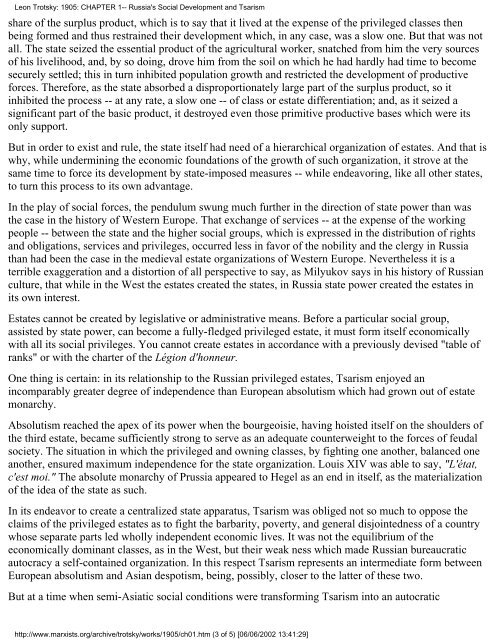Leon Trotsky: 1905
Leon Trotsky: 1905
Leon Trotsky: 1905
Create successful ePaper yourself
Turn your PDF publications into a flip-book with our unique Google optimized e-Paper software.
<strong>Leon</strong> <strong>Trotsky</strong>: <strong>1905</strong>: CHAPTER 1-- Russia's Social Development and Tsarism<br />
share of the surplus product, which is to say that it lived at the expense of the privileged classes then<br />
being formed and thus restrained their development which, in any case, was a slow one. But that was not<br />
all. The state seized the essential product of the agricultural worker, snatched from him the very sources<br />
of his livelihood, and, by so doing, drove him from the soil on which he had hardly had time to become<br />
securely settled; this in turn inhibited population growth and restricted the development of productive<br />
forces. Therefore, as the state absorbed a disproportionately large part of the surplus product, so it<br />
inhibited the process -- at any rate, a slow one -- of class or estate differentiation; and, as it seized a<br />
significant part of the basic product, it destroyed even those primitive productive bases which were its<br />
only support.<br />
But in order to exist and rule, the state itself had need of a hierarchical organization of estates. And that is<br />
why, while undermining the economic foundations of the growth of such organization, it strove at the<br />
same time to force its development by state-imposed measures -- while endeavoring, like all other states,<br />
to turn this process to its own advantage.<br />
In the play of social forces, the pendulum swung much further in the direction of state power than was<br />
the case in the history of Western Europe. That exchange of services -- at the expense of the working<br />
people -- between the state and the higher social groups, which is expressed in the distribution of rights<br />
and obligations, services and privileges, occurred less in favor of the nobility and the clergy in Russia<br />
than had been the case in the medieval estate organizations of Western Europe. Nevertheless it is a<br />
terrible exaggeration and a distortion of all perspective to say, as Milyukov says in his history of Russian<br />
culture, that while in the West the estates created the states, in Russia state power created the estates in<br />
its own interest.<br />
Estates cannot be created by legislative or administrative means. Before a particular social group,<br />
assisted by state power, can become a fully-fledged privileged estate, it must form itself economically<br />
with all its social privileges. You cannot create estates in accordance with a previously devised "table of<br />
ranks" or with the charter of the Légion d'honneur.<br />
One thing is certain: in its relationship to the Russian privileged estates, Tsarism enjoyed an<br />
incomparably greater degree of independence than European absolutism which had grown out of estate<br />
monarchy.<br />
Absolutism reached the apex of its power when the bourgeoisie, having hoisted itself on the shoulders of<br />
the third estate, became sufficiently strong to serve as an adequate counterweight to the forces of feudal<br />
society. The situation in which the privileged and owning classes, by fighting one another, balanced one<br />
another, ensured maximum independence for the state organization. Louis XIV was able to say, "L'état,<br />
c'est moi." The absolute monarchy of Prussia appeared to Hegel as an end in itself, as the materialization<br />
of the idea of the state as such.<br />
In its endeavor to create a centralized state apparatus, Tsarism was obliged not so much to oppose the<br />
claims of the privileged estates as to fight the barbarity, poverty, and general disjointedness of a country<br />
whose separate parts led wholly independent economic lives. It was not the equilibrium of the<br />
economically dominant classes, as in the West, but their weak ness which made Russian bureaucratic<br />
autocracy a self-contained organization. In this respect Tsarism represents an intermediate form between<br />
European absolutism and Asian despotism, being, possibly, closer to the latter of these two.<br />
But at a time when semi-Asiatic social conditions were transforming Tsarism into an autocratic<br />
http://www.marxists.org/archive/trotsky/works/<strong>1905</strong>/ch01.htm (3 of 5) [06/06/2002 13:41:29]















![tyf Enf=O=n]lgg](https://img.yumpu.com/47584932/1/190x245/tyf-enfonlgg.jpg?quality=85)

